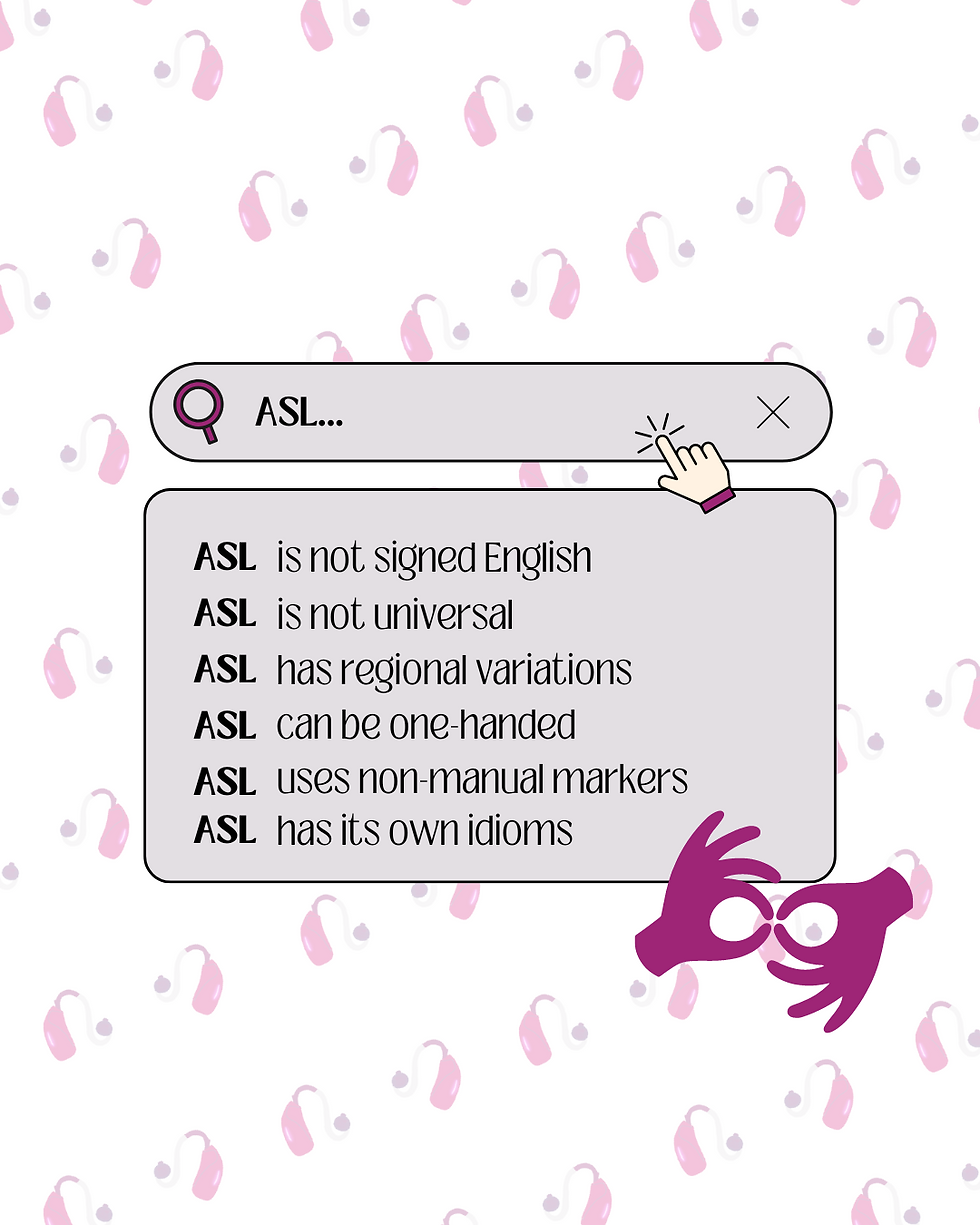What Can You Call Those with Hearing Loss?
- Apr 25, 2024
- 3 min read
Updated: Dec 17, 2024
The first thing I want to mention is that I do not speak for entirety of the Deaf Community. Additionally, how you choose to label yourself (deaf, hard-of-hearing, hearing impaired) is truly up to you.
As a reminder, deafness is a spectrum and some people can still hear ambient sounds and others, nothing at all. Some speak. Others do not. Some sign, others do not.
However, there are some terms that are acceptable within the Deaf community as a whole. I'm going to explain some of the terms for you.
Acceptable Terms

Hearing Loss
This is a encompassing term for anyone who has any kind of hearing loss from mild to severe/profound.
Deaf
This term implies that a person's hearing is in the severe and/or profound range.
d/Deaf
Within the Deaf Community, people can identify as a "little d" or a "big D" deaf. What does this mean? The "big D" is a term only reserved for statements involving your deaf identity. It is not when discussing deafness as a disability, these terms are not used.
Big D: One who is culturally deaf. They are a part of a deaf community.
Little D: One who is just a deaf person. They may be in the hearing community and may not know ASL, preferring to speak.
Hard-of-Hearing
This is a person who has hearing loss. They are not deaf and they are not hearing. Many hard-of-hearing people wear hearing aids, or has a cochlear implant, to help boost their hearing abilities.
This is a very large group as it can range from an older person with late onset hearing loss or a person who has significant hearing loss for most of their lives.
If Hard-of-Hearing is capitalized, it often denotes that the person is involved within the Deaf Community.
Late Deafened
Typically, a person who is late deafened was born hearing and lost their hearing later in life. Many do not know sign language.
Deaf-blind
Someone with hearing and vision loss. Like the hearing spectrum, they could have anything from usable vision to legally blind.
Unacceptable Terms
Hearing Impaired
No. Absolutely not.
We are not impaired. There is nothing wrong with us. We simply do not hear.
This was originally a hearing medical term assigned to the Deaf Community and is considered negative, biased and hurtful.
I will note: there are deaf people who use this term to self-identify. That is up to them. But a hearing person should not refer to anyone as impaired.
Mute
Please do not use this, especially in combination of deaf-mute.
Many deaf people choose to not voice or were forced through speech therapy. Non-verbal is a nicer term to use.
How do I identify?
I identify as both Hard-of-Hearing and Deaf. I was born hearing but became sick around two or three years old but it wasn't found until I was in kindergarten (state-required hearing tests). I got my first hearing aids then. I also wear glasses and while I have a mild-to-severe hearing loss, much of my comprehending of the sounds depends on lip-reading, but without my glasses, and hearing aids, I "hear" much less. Additionally, I grew up without the Deaf community and it wasn't until college that I began getting involved with the community and learning ASL. (I'll explain more detail in a longer blog post about my hearing loss journey - and my acceptance of being Deaf.)
Any terms I’ve missed over that you want to know about? Comment on it below. I love questions and am happy to discuss. As always with any identities, please don’t assume what terms I prefer.




Comentarios